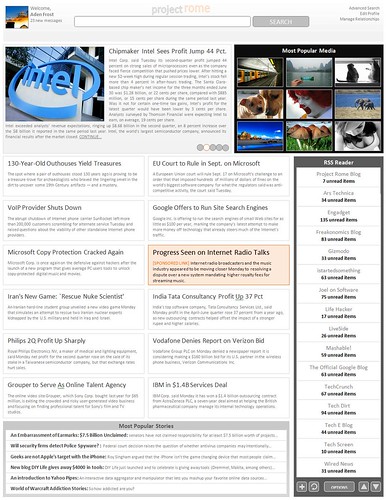The tech world spins fast, and it keeps getting faster with each passing day. Hundreds of startups are popping up every day, hoping to be the next big thing on the web, few make the cut. Ten years ago Google was one such startup who made the cut, and made it big. Google is now one of the giants of the tech world, on par with companies like Microsoft, and Yahoo. And every startup today has one dream, to be the next Google.
The web has always been about content and providing the right content to the right people. In the olden days of the web, MSN and Yahoo! became huge because they presented a variety of content, so that there would be something for everybody. Eventually Google improved search enough so that people could simply search, and get back results (such as websites, blog posts, articles,etc) that might interest them. Nowadays search doesn't cut it anymore, you have to enter a correctly worded search term and then shuffle through the results to find the one you want. Ideally, you should not have to search at all, stories and articles of interest should find you, not the other way around. They should be brought to you in a sort of "Personalized Inbox".
Nowadays search doesn't cut it anymore, you have to enter a correctly worded search term and then shuffle through the results to find the one you want. Ideally, you should not have to search at all, stories and articles of interest should find you, not the other way around. They should be brought to you in a sort of "Personalized Inbox".
Now, I know what you are thinking, that's what RSS feeds are for. But for RSS feeds to work you need to subscribe to each individual feed. Also, not all posts from a blog might interest you. RSS, as great as it is, is not the solution.
Sites like Techmeme and particularly Digg, try to present the recently popular stories for a niche, but even with these sites you are getting only the stories that the majority of the users find interesting. Therefore, you may find the some, or even most of the stories don't interest you.
The mockup to the left is concept design of how a "personalized inbox" might be. It is generally a cross between Digg and StumbleUpon, where the stories on the frontpage aren't simply determined by the popularity but also by you interests, which can be determined in a number of ways, the most simple of which is by the nature of stories that you read and liked previously, or by matching you with other users of similar taste. Either way the more you use the site the more accurate it becomes, until you reach the point when each and every story that end up on your page in perfectly suited to your taste.
Let me quickly describe the mockup. The top portion is the search box, which should work like Google, except the results should be tailored to your interests. Below that is the Editor's Pick section that provides you with urgent or breaking news in your niche. Underneath that follows the stories, which is what the site is about. On the right there is a module that shows the most popular media (such as images or videos or even podcasts), and beneath that is list of your RSS Feeds of sites or blogs that you love or want to keep track of, religiously. At the bottom is the most popular stories, which is simply what the current Digg homepage is like, this module will help you discover new articles.
Now the mockup is far from perfectly, but the concept behind it is clear. The current generation of personalized homepages, like Netvibes and Live.com, are nothing more than glorified feed aggregators, and they need to evolve beyond that to bring forth a truly innovative product. After all, the tech world spins fast, and its about time we got a "new Google".
No comments:
Post a Comment